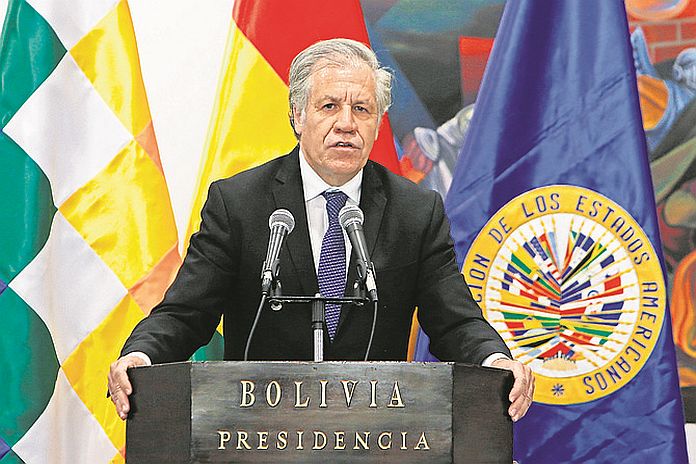By Caribbean News Global ![]()
WASHINGTON, USA – The General Secretariat of the Organization of American States (OAS) states that it has taken due note of the concerns expressed in communications from various international bodies given the recent events in Bolivia, and has expressed its own concern about the abuse of judicial mechanisms that once again “they have become repressive instruments of the ruling party.”
“This fact has been a matter of concern for the OAS general secretariat since its presence was required to assess the lack of guarantees in the hearings that sought to substantiate accusations against Samuel Doria,” likewise, “the OAS observed the elections of the judicial power in the country, which were held without the participation of the opposition, as it was considered that the process was lacking in guarantees and that the cooptation of that power of the State by the ruling party was very advanced.
“The OAS general secretariat had to take steps regarding the prosecution of opposition leaders such as former presidents Carlos Mesa and Jorge Quiroga,” and “in recent months, the cancellation or dismissal of different trials against MAS supporters has been confirmed, as well as threats of judicial persecution of politicians opposed to the government.”
Unfortunately, said the OAS general secretariat “ these threats have materialized in many cases,” and in this context, said, “it is important to remember that the Inter-American Democratic Charter in Article 3 defines the separation and independence of public powers as an essential element of representative democracy.”
According to the OAS general secretariat: “In this sense, the Bolivian judicial system is not in a position to provide the minimum guarantees of fair trial, impartiality and due process, due to structural problems and, in particular, its composition.
Obviously, impunity is never an option either for crimes against humanity or for corruption. The concepts of justice, memory, truth and non-repetition are fundamental when it comes to uniting a better society.”
By virtue of the above, the OAS general secretariat considers it necessary:
- To form, within the framework of the UN and/or the OAS system, an international commission to investigate cases of corruption from the last period of government of former president Evo Morales to the present, obviously including the period of the transitional government;
- Refer complaints about possible crimes against humanity to the International Criminal Court (ICC) so that the trial is impartial and takes into account objective variables of responsibility;
- Reform the judicial system through a deep political dialogue of all political, academic and social actors, as well as – if deemed appropriate – international cooperation. Judicial reform is essential to legitimately transform this branch into an independent state power and reverse the accelerated process of cooptation that it is currently undergoing;
- The release of all detainees within the framework of this context, until impartial processes and mechanisms are in place to determine responsibilities such as those indicated above, and especially taking into account the existence of variables of political persecution such as those denounced by the CASLA Institute.





